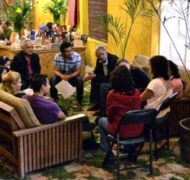Ruth and Parables: Small Group Leaders Guide Week 5
Study Guide / Produced by Individual TOW Project member
This content is part of the Ruth and Parables curriculum, an 11-week integrated sermon and small group series on faith and work.
Read Ruth 2:5-15
Topic 1 – Respect at work
Boaz put his respect for his workers into practice by providing them with water as they worked (Ruth 2:9), by eating with them, and most of all by sharing his food with the person regarded as the lowest among them (Ruth 2:14). Later we learn that at harvest time, Boaz the landowner winnowed with his harvesters and slept with them out in the field (Ruth 3:2–4, 14).
Boaz demonstrated a high view of every human being as an image of God (Genesis 1:27, Proverbs 14:31, 17:5) by the sensitive way he treated the alien woman in his workplace. When he heard that she was a Moabite woman who had returned from Moab with Naomi (Ruth 2:6), and heard of her plea for permission to glean behind his harvesters (Ruth 2:7), shockingly, the first words he said were, “Listen carefully my daughter.” Sharing his food with a foreign woman (Ruth 2:14) was a more significant act than it might appear. Respectable landowning men were not accustomed to conversing with foreign women, as Ruth herself points out (Ruth 2:10). A man with more concern for social appearances and business opportunities, and less compassion for someone in need, might have sent a female Moabite intruder off his land at once. But Boaz was more than willing to stand up for the vulnerable worker in their midst, whatever the reaction of others might be. Indeed with this account we may have encountered the world’s earliest recorded anti-sexual harassment policy in the workplace. Boaz’ workers seemed to catch his generous spirit. When their boss greeted them with a blessing, they blessed him in return (Ruth 2:4).
Questions
- What kinds of respect are given in your workplace? What kinds of disrespect are customary? What determines who is respected and who isn’t?
- What is your role in the respect/disrespect customer where you work? What do you do to respect the most vulnerable or least respected people there? Take a moment to appreciate anything you do. If you challenge the patterns of disrespect in a workplace, it can be very costly emotionally, and it can impair your career advancement. This not necessarily/only because of prejudice, but also because the organization sees little value in the people it doesn’t respect, so paying attention to their needs is not regarded as contributing to the main goals of the organization. Would it be worth it to you to risk or sacrifice your career path to respect the people whom others don’t?
Topic 2 – To know is to love is to care
Questions
- Steve mentioned three people whose personal knowledge of the needs of a group of people led them to love and to do something through their work:
- Nader Twal, the teacher-training director in Long Beach, CA
- Chef Mike, the chef who hires people who’ve done time in prison
- Hamdi Ulukaya, the Chobani billionaire who pledged $700 million to help Kurdish refugees
Is there one of the three that speaks most directly to you and your situation? Is that because of their knowledge, their love, or their practical actions of caring?
- What human needs are you aware of through your work? Does your knowledge you love in some way? Does your love lead you to take care of those needs? Is there a way in which you experience this chain of knowing-loving-caring in this situation as a gift from God, or does it seem like a burden?
Read Matthew 21:28-32
‘The parable of the two sons (Matt. 21:28-32) continues earlier stories in Matthew about the people who actually are part of God’s kingdom. Jesus tells the religious leaders in his audience that “tax collectors and prostitutes are going into the kingdom of God ahead of you” (Matt. 21:31).The folks who look the least religious will enter God’s kingdom ahead of religious leaders, because in the end they do God’s will.
In work, this reminds us that actions speak louder than words. Many organizations have mission statements declaring that their top aims are customer service, product quality, civic integrity, putting their people first, and the like. Yet many such organizations have poor service, quality, integrity, and employee relations. Individuals may do the same thing, extolling their plans, yet failing to implement them. Organizations and individuals falling into this trap may have good intentions, and they may not recognize they are failing to live up to their rhetoric. Workplaces need both effective systems for implementing their mission and goals, and impartial monitoring systems to give unvarnished feedback.’[*]
Topic 3 – Saying no/doing yes
Steve’s fill-in sheet offered 5 ideas for moving from saying no to doing yes when it comes to knowing-loving-caring:
- Listen for and respond to invitations from Jesus.
- These invitations will most often relate to the people and things you know most.
- To know is to care is to love – pour into this knowledge flow.
- Confess and disrupt your inner stoic and cynic – wherever you lack care or courage.
- Take one risk each day to live with greater purpose and passion
Questions
- Which of the suggestions from Steve’s fill-in sheet do you most want to say “no” to?
- What specifically do you not want to agree with or do in your work life? Why?
- How could you possibly take the first step to doing it nonetheless?
- Which of the suggestions do you immediately want to say “yes” to? Why? What do you forecast the result will be?










